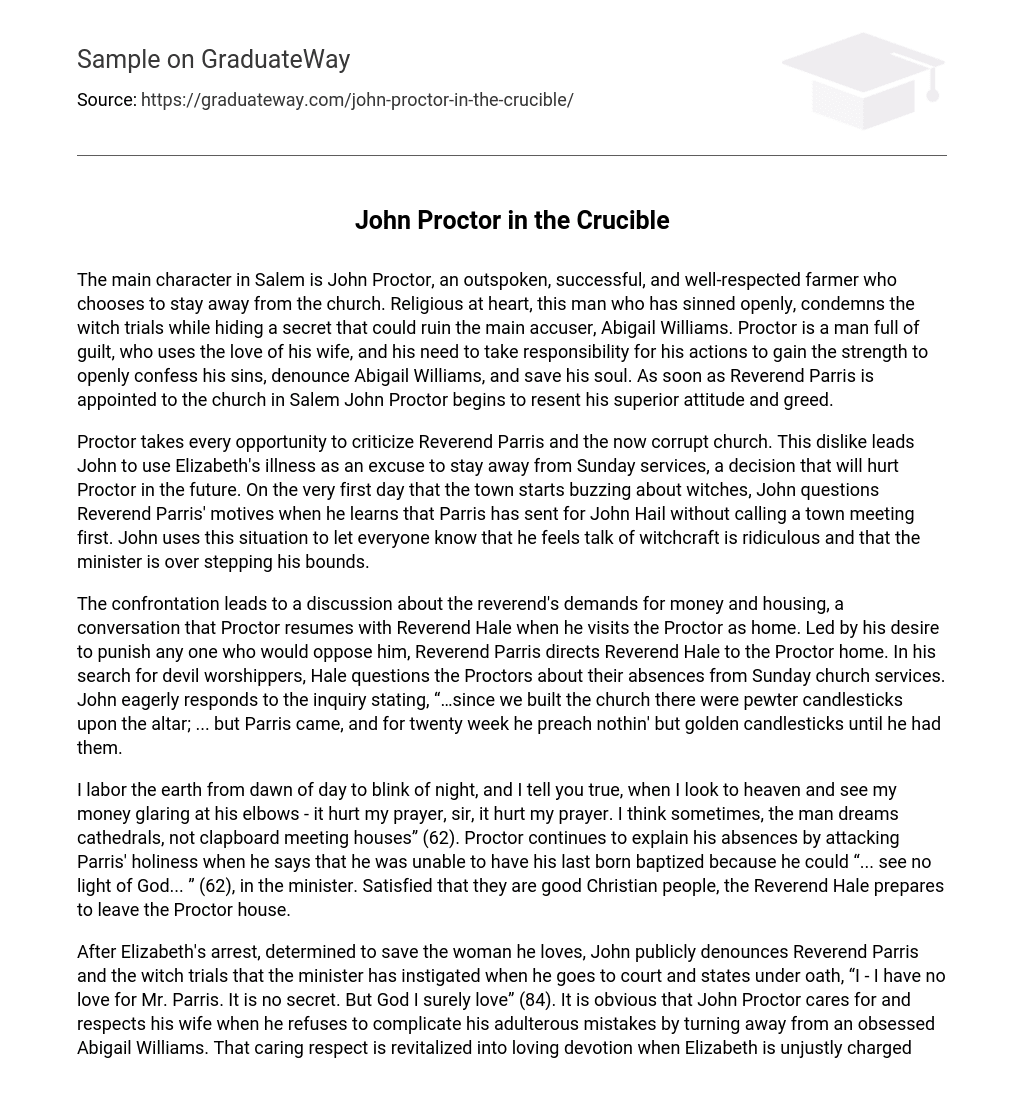John Proctor is the main character in Salem. He is a successful and well-respected farmer who chooses not to attend church. Despite being religious himself, Proctor openly denounces the witch trials while hiding a secret that could bring down the main accuser, Abigail Williams. He carries a heavy guilt and relies on his love for his wife and his desire to take responsibility for his actions in order to find the strength to confess his sins, expose Abigail Williams, and save his own soul. Proctor’s resentment towards Reverend Parris begins as soon as he becomes the new church leader in Salem due to Parris’ superior attitude and greed.
Proctor consistently criticizes Reverend Parris and the presently corrupted church, taking advantage of any opportunity to do so. This animosity prompts John to utilize Elizabeth’s illness as a pretext for abstaining from attending Sunday services, a decision that will ultimately harm Proctor. On the initial day that the town begins to gossip about witchcraft, John becomes suspicious of Reverend Parris’ intentions upon discovering that Parris has summoned John Hale without first consulting the town. John seizes this situation to express his belief that discussions of witchcraft are absurd and that the minister is exceeding his authority.
The Proctor household becomes a setting for a discussion between Proctor and Reverend Hale regarding the demands made by the reverend for money and housing. Reverend Parris, driven by his determination to punish anyone who opposes him, orders Reverend Hale to visit the Proctor residence. As part of his investigation into alleged devil worship, Hale interrogates the Proctors about their absence from Sunday church services. John enthusiastically replies to the question, recounting how pewter candlesticks originally adorned the church altar. However, Parris arrived and for twenty weeks preached exclusively about the need for golden candlesticks until he obtained them.
Proctor expresses his frustration, stating that his hard work is overshadowed by his desire for wealth. He compares the image of his money to a heavenly figure, which has a negative impact on his prayers. He suggests that Parris is more interested in grand architecture than in fostering a spiritual community. Proctor also explains his absence by criticizing Parris’ lack of holiness, claiming that he couldn’t find any spiritual guidance from the minister. The Reverend Hale, convinced of their strong faith, prepares to depart from the Proctor residence.
Following Elizabeth’s arrest, John expresses his affection for her and criticizes Reverend Parris and the witch trials during his court testimony. He declares, “I – I do not hold any love for Mr. Parris. It is a well-known fact. However, God knows that I truly love” (84). Despite his previous transgressions with Abigail Williams, John refuses to abandon his spouse and remains loyal to her. When Elizabeth is unjustly accused of practicing witchcraft, his love and commitment towards her are rekindled, and he pledges to bring her back home.
Before leaving, she assures Proctor that she will bring him back home soon (77). However, when he discovers that his wife has been accused by Abigail, Proctor realizes that he has concealed his affair for far too long. His obsession with upholding his reputation in the community has made him vulnerable and given Abigail the upper hand. Driven by his love for Elizabeth, Proctor desperately tries to convince Mary Warren, their young housekeeper, to testify in court and reveal the falsehoods of Abigail Williams and the rest of the girls. In order to achieve this objective, John resorts to threats…
“I will bring your guts into your mouth but goodness will not die for me” (76). In court, Mary Warren yields to Abigail’s gaze and declines to give evidence. John Proctor is arrested for trying to undermine the witch trials and is wrongly charged with lying about his affair with Abigail in order to discredit her. Despite attempting to make up for his previous wrongdoings, John seizes his last chance to declare his love for Elizabeth before he is executed. “You are a marvel, Elizabeth” (134), he declares before being taken to the gallows.
John Proctor, despite feeling contempt, guilt, and love, understands that he must take responsibility for his actions. This is crucial for him to seek forgiveness from God and find inner tranquility. At first, Proctor confesses in court about his affair with Abigail Williams, who is the main accuser. His initial intention was to shield his wife from being executed, particularly after the court discovered Elizabeth’s pregnancy. Yet, his conscience overpowers him and drives him to try exposing Abigail in order to save his innocent friends.
When asked if he would drop his charges now that Elizabeth was saved, Proctor replied “I – I think I cannot” (85). After unsuccessfully trying to halt the witch trials to save his friends, John Proctor is accused of devil worship and imprisoned. Proctor is offered his release in exchange for a written confession and the identification of other devil worshippers. John asserts “I speak my own sins; I cannot judge another. I have no tongue for it” (131), as he opts not to respond.
Despite feeling inadequate, Proctor succumbs to the pressure and lies once more by signing a confession for worshiping the devil in order to save his life. Nevertheless, his true virtuous nature emerges when he tears up the confession and chooses to stand with his companions in death instead of unfairly accusing them of being witches. Proctor’s determination to regain his integrity is evident through his disdain for Reverend Parris, his love for his wife, and his desire to take accountability for his actions. These motivators drive him to confess his sins, reject Abigail Williams, and redeem his soul amidst the Salem Witch Trials.





